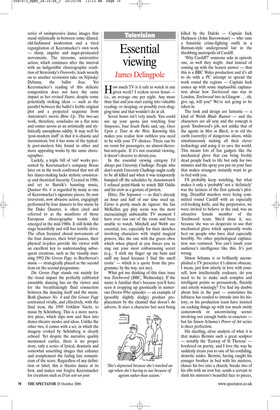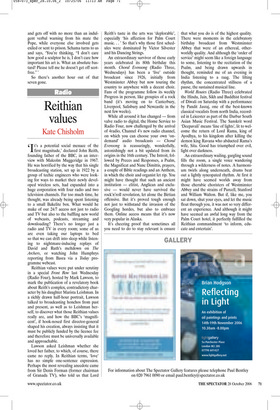Essential viewing
James Delingpole
How much TV is it safe to watch in any given week? I reckon seven hours i.e., an average one per night. Any more than that and you start eating into valuable readingor sleepingor possibly even shagging-time and that wouldn’t do at all.
Seven hours isn’t very much. You could use up your quota just watching four Simpsons, four South Parks and, say, Once Upon a Time in the West. Knowing this makes you realise how ruthless you need to be with your TV choices. There can be no room for passengers, no almost-theresbut-not-quite. If it’s not essential viewing, it doesn’t deserve to detain you.
In the essential viewing category I’d always put University Challenge. People who don’t watch University Challenge ought really to be all killed and when it was temporarily bumped off the schedules by Autumnwatch I refused point-blank to watch Bill Oddie and his crew as a gesture of protest.
Ditto, The Sopranos — so that’s already an hour and half of our time used up. Extras is pretty much de rigueur: the Ian McKellen gay play scene was the most excruciatingly unbearable TV moment I have ever run out of the room and been unable to watch. Mitchell and Webb are essential, too, especially for their sketches involving characters with stupid magical powers, like the one with the green oboe which when played at you forces you to sing out your most embarrassing secret (e.g., ‘I stick my finger up my bum and sniff my hand because I find the smell erotic’ — which is a quote from the programme, by the way, not me).
What got me thinking of this time issue was Torchwood (BBC, Wednesday). If the name is familiar that’s because you’ll have seen it cropping up gnomically in numerous Doctor Who episodes — an example of (possibly slightly dodgy) product preplacement by the channel that doesn’t do adverts. It stars a character last seen being killed by the Daleks — Captain Jack Harkness (John Barrowman) — who runs a futuristic crime-fighting outfit in a Batman-style underground lair in the throbbing metropolis of Cardiff.
‘Why Cardiff?’ someone asks in episode one, as well they might. And instead of coming up with the honest answer — that this is a BBC Wales production and it’s all to do with a PC attempt to spread the work round the regions — Captain Jack comes up with some implausible explanation about how Torchwood one was in London, Torchwood two in Glasgow ... oh, give up, will you? We’re not going to be taken in.
The look and design are fantastic — a kind of Welsh Blade Runner — and the characters are all sexy and the concept is good: Torchwood’s job, not unlike that of the agents in Men in Black, is to rid the earth (secretly) of dangerous aliens, while simultaneously nicking all their clever technology and using it to save the world. This means lots of fun gadgets like the mechanical glove that can bring freshly dead people back to life but only for two minutes and the spray you put on your face that makes strangers instantly want to go to bed with you.
I’ll probably keep watching, but what makes it only a ‘probably’ not a ‘definitely’ was the laziness of the first episode’s plotting. Dreadful murders were being committed round Cardiff with an especially evil-looking knife, and the perpetrator, we were invited to believe at the end, was an attractive female member of the Torchwood team. She’d done it, see, because she was so desperate to use that mechanical glove which apparently works best on people who have died especially horribly. No other psychological explanation was ventured. You can’t insult your audience’s intelligence like this. It’s just wrong.
Simon Schama is so brilliantly accomplished a TV presenter it’s almost obscene. I mean, just how utterly in love with yourself, how intellectually cocksure, do you need to be to make such complex and intelligent points so persuasively, fluently and utterly winningly? I’ve had my doubts about him in the past — sometimes his leftiness has tended to intrude into his history, or his production team have insisted on cocking things up with too much swirly camerawork or unconvincing scenes involving not enough battle re-enactors but his Simon Schama’s Power of Art series is sheer perfection.
His dazzling, close analysis of what it is that makes Bernini such a great sculptor — notably the ‘Ecstasy of St Theresa’ bordered on poetry, and I love the way he suddenly treats you to one of his confiding, demotic asides. Bernini, having caught his younger brother in bed with his mistress, chases his bro into a church, breaks two of his ribs with an iron bar, sends a servant to slash his mistress’s beautiful face to pieces, and gets off with no more than an indulgent verbal warning from his mate the Pope, while everyone else involved gets exiled or sent to prison. Schama turns to us and says, ‘You’re thinking, “I don’t care how good a sculptor he is, I don’t care how important his art is. What an absolute bastard! Please tell me he doesn’t get off scotfree.” ’ So there’s another hour out of that seven gone.



























































































 Previous page
Previous page